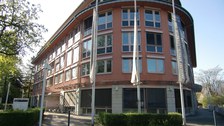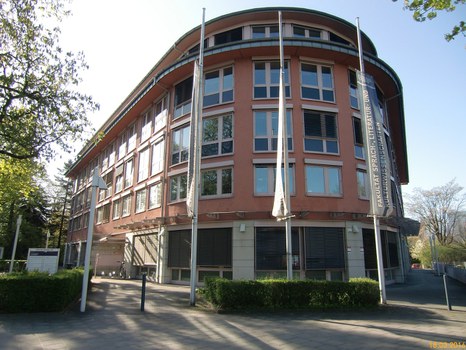Профіль інституту
The Institute of Slavic Studies was founded in 1992 as part of the Faculty of Linguistics, Literature and Cultural Studies and currently has around 400 students.
Chairs and departments
The Institute of Slavic Studies encompasses four Chairs and two departments:
Chair of Linguistics and History of Slavic Languages:
Slavic linguistics addresses both the history of Slavic languages (especially Eastern and Western Slavic) and the contemporary languages in their systems and their use. The focus is on both historical and contemporary communicative varieties in social and communicative contexts: e.g. in political, religious or economic discourse, in conflict communication or in the relationship between majority and minor languages. The theoretical basis is formed by semantics (theory of meaning) and pragmatics (language in communicative action). Cultural Linguistics is a term used to describe linguistic studies on the use of language in historical, ethnic, national and discursive contexts.
Chair of Slavic Literatures:
At the Chair of Slavic Literatures, Slavic literature and cultures are taught and researched in their entire geographical and chronological scope. There is a particular focus on Russian, Polish, Czech and Ukrainian culture as well as on the cultures of Eastern European minorities.The first focus of research and teaching is the field of alternative and dissident art and literature from the late Soviet period to the present. In the project 'Alternative Aesthetic Cultures in Eastern Europe since 2000', the critical tendencies and artefacts towards oppressive politics or towards the politically influenced mainstream will be examined.
The second focus is on the area of boundary phenomena and transfer processes in literature, culture, and science. Here, the emphasis is on problems of trans- and interculturality in the Slavia, translation cultures between East and West, minority cultures between tradition and modernity, as well as cultural space and topography research.
Chair of Western Slavic Literatures and Cultural Studies:
From the spectrum of Western Slavic studies, the Chair in research and teaching focuses in particular on subjects of Polish Studies and Sorabistics. This includes the history of Polish literature and culture from the Renaissance to the present with a focus on Romanticism and the interwar period. Sorbian literature and culture are examined in their entire breadth; especially literature from the middle of the 20th century. The topics and questions in research and teaching refer to a comprehensive interest in the knowledge of structures in the Western Slavia that are specific to particular eras and cultural areas. These structures, both in comparison and through in-depth analyses of cultural narratives, provide the basis for comprehensive insights within the research priority area Culture and Societal Change at TU Dresden. The basis for theses studies is a semiotic approach to culture that is based on a broad understanding of the functionality of cultural texts from epic to rock songs. In connection with current tendencies in the theory construction in literature and cultural studies, this results in minority cultures being a focal area of research.
Chair for Sorabistic Studies
- text will be available soon -
Department of Russian Cultural Studies and Didactics:
The department focuses on cultural studies from a contemporary, cultural-historical and didactic perspective. Special attention is paid not only to contemporary and Soviet Russia, which is clearly in focus, but also to Russian-speaking post-Soviet states. This allows Russian Studies to be pursued in all its breadth and diversity. The analytical examination of cultural phenomena follows the communication practices and popular visual media of the pre-digital and digital era. In this process, Russian culture is invariably seen in the context of politics and society, and its social and political orders, urban and regional developments, cultural institutions, and everyday practices are examined accordingly.
Department Language Training (Russian, Polish, Czech and Upper Sorbian)
The Institute of Slavic Studies provides students with a sound practical language education (A1 to C1) in Russian, Polish, Czech, and Upper Sorbian.
Focal areas of teaching
The focal areas of teaching at the Institute of Slavic Studies are:
- practical language training
- Russian, Polish, Ukrainian, and Czech culture and literature
- diachronic and synchronic linguistics
- cultural linguistics
- philological cultural studies
- literary studies
-
Slavic-Jewish studies
-
Culture of the ethnic minorities in Eastern Europe
-
everyday culture in Eastern Europe and
-
political art and literature of the late and post-Soviet period
Cooperation
Cooperation has been established with universities and partners in St. Petersburg, Moscow, Ekaterinburg, Kazan, Omsk, Minsk, Astana, Kiev, Plovdiv, Wroclaw, Poznan, Opole, Krakow, Edmonton, Prague, Brno, Ostrava, Ústí nad Labem, and Bratislava.
Guest lectures by university teachers from Polish, Czech, Russian, and Bulgarian universities add to the range of courses offered. The Institute organises excursions to various Slavic countries at regular intervals.






